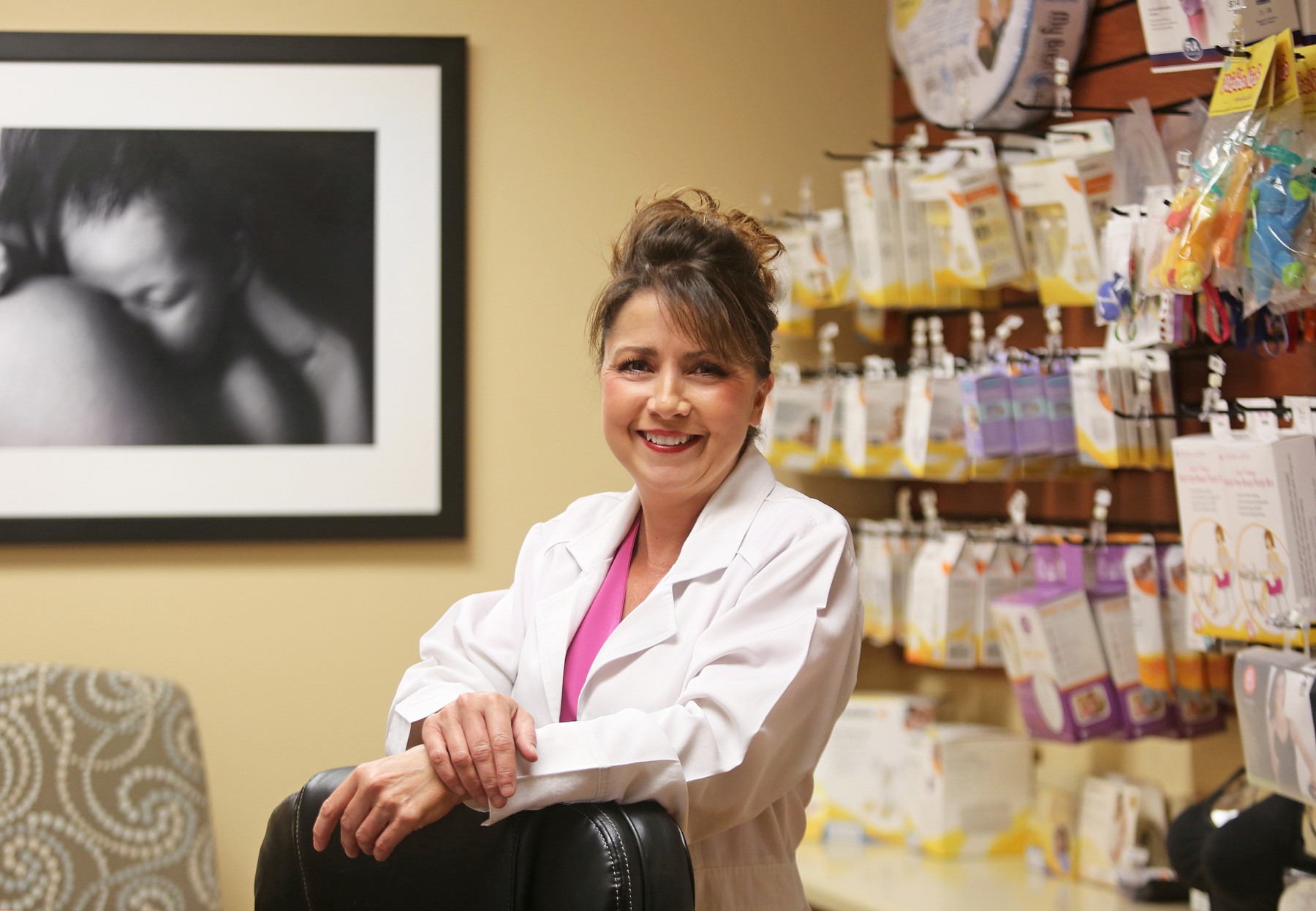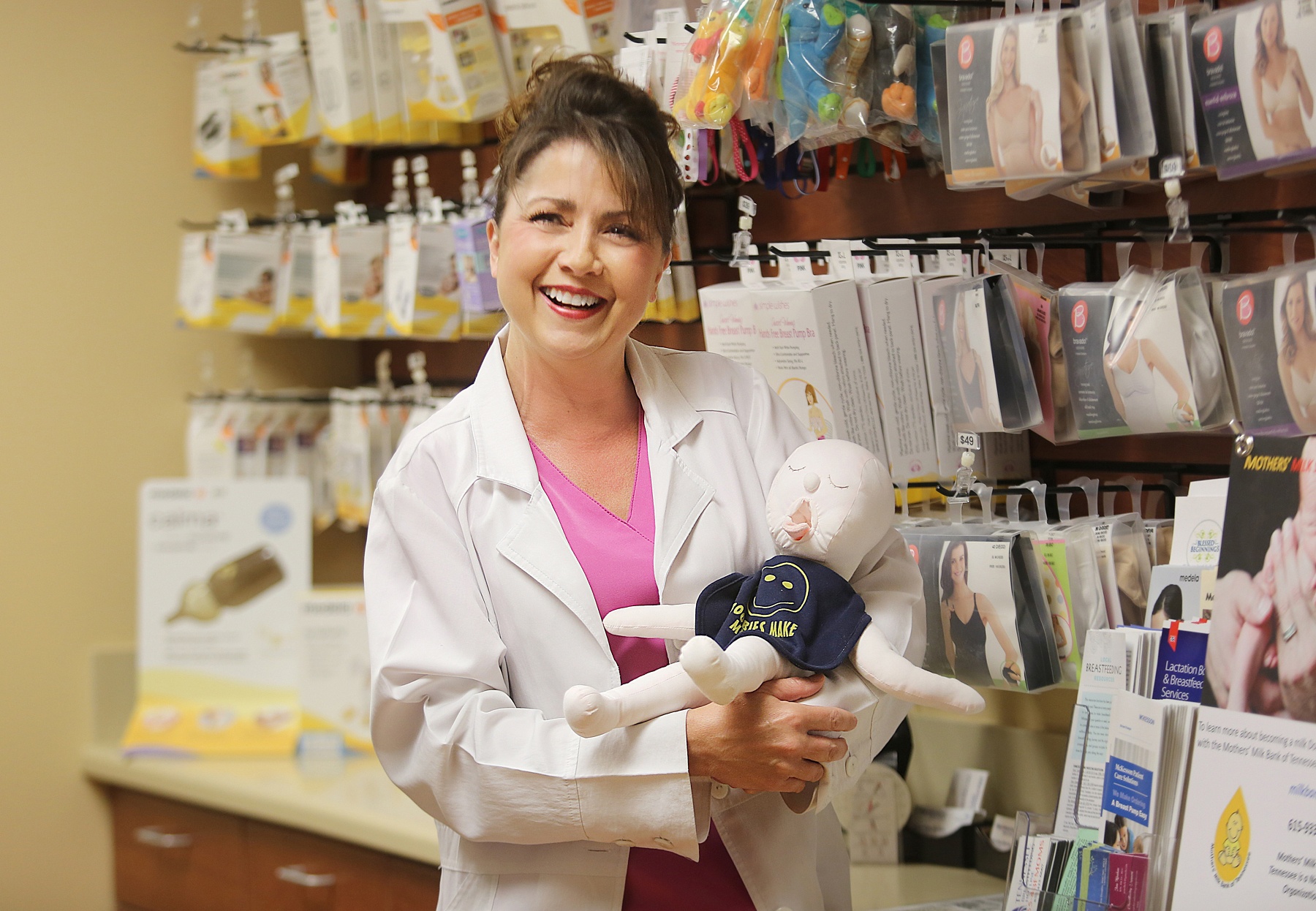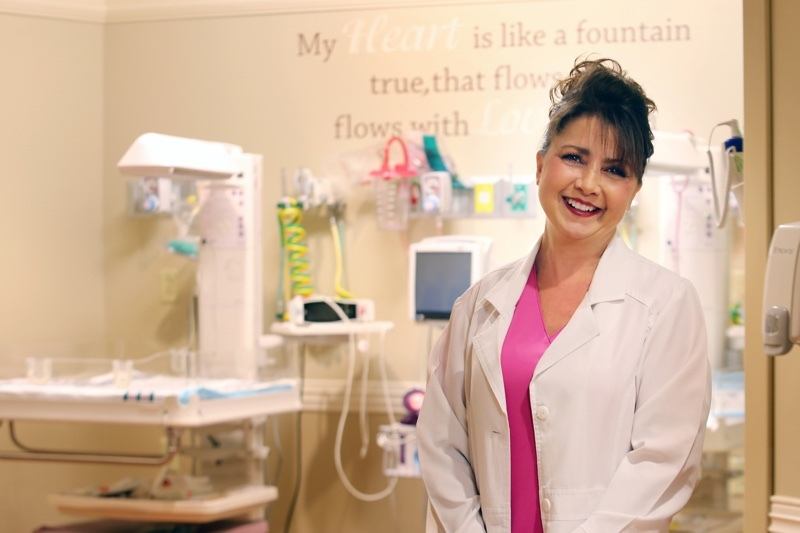Noreen Webb breastfed her first daughter while she served as an Air Force medic during Desert Storm. She breastfed her second daughter through nursing school. It wasn’t easy, but it’s what inspired her to help other moms. Determination will overcome struggles in life.
With 23 years of nursing experience and 16 years as a lactation consultant (not to mention her firsthand experience as a mother and now grandmother), Noreen is not only passionate about working at TriStar StoneCrest, she’s also well-versed in the benefits, challenges and myths associated with breastfeeding. We sat down with our newest Face of TriStar to discuss all things breastfeeding.

How do you help moms while they are in the hospital?
One of my favorite times with moms is right after they deliver. We really have time to educate the mothers and family and introduce the baby skin-to-skin contact with the mother. It helps with her natural hormones and makes the milk flow easier. Plus, the baby has time to smell mother and the association with colostrum, which is very similar to the smell of the amniotic fluid in the womb, so immediately after birth, we want the baby to latch on and start breastfeeding. Babies are instinctual. With the first feeding, they’re not starving, rather they smell and they hear the mother and father, making them more eager as well as establishing a comfort level to the newborn. It is a nice transition for baby and empowering to moms because it’s like, “Oh wow, I can do this.” We make it a priority after every delivery, unfortunately we are not there 24 hours, but the nurses are great at assisting as well.
What about when Mom and Baby leave the hospital?
They always have our phone number. We hear from Mom, Dad, Grandmother; we hear from everybody! Pediatricians and OB/GYNs refer parents for one-on-one help in an outpatient consultant for an hour-and-a-half. We spend time educating, latching on and pre- and post-weights with baby, whatever the concern for the consult may be. For more than 11 years, TriStar StoneCrest has held a support group every Wednesday. It’s free, and it’s for everyone — it’s not just for babies that were born at TriStar StoneCrest. I encourage first-time breastfeeding moms to come prenatally to ask questions and observe moms breastfeeding. Every breastfeeding experience is different, so it is not unusual to have seasoned mothers come for help or to mentor. The support group can range from a two-day-old baby that just left the hospital to a 15-month-old baby. It’s unique in the sense that these moms are now watching what will happen at six months and beyond. The mentoring and friendships that are established in the weekly support group is magical.

Talk about the milk donor program TriStar StoneCrest launched last year.
We opened our milk depot in November 2017. The process to become a registered milk donor is simple; it requires a phone interview and labs drawn free of charge. Mother’s will be notified if they qualify as a registered milk donor and will be assigned a number. After mom donates her milk, we ship it off to a milk bank. It is processed similar to blood donations, and then they can send it off to premature babies around the US. Since last year, we have had more than 17,000 ounces donated. Of our 20 donors, we have three generous mothers that have gone through a fetal demise, and this is their way of mourning and giving back. Very empowering and uplifting.
What are some of the challenges women face while breastfeeding?
I firmly believe having a support system is extremely important. But at the same time, I’ve had mothers who say none of their family members breastfed, and it inspires them to do it. Also, some hospitals have higher induction rates, and you see a lot C-Sections or a high rate of premature births. Mother’s pregnancy and delivery can have an effect on initiating breastfeeding. It is the determination of the mother, initiating breastfeeding immediately or pumping, family and environmental support that is key to overcoming some of these challenges. I believe it’s really important as a consultant to find out what is going to work for the family. It’s not straightforward and that’s key when you’re having challenges. We see latching issues, low milk supply or excess milk supply. We have moms wanting to wean, and mothers who are going back to work. That is why I think the support group is so beneficial because it keeps moms motivated and we can help when challenges arise.

What are some of the biggest benefits associated with breastfeeding your child?
If I were to test your milk of a mother that delivered a 33 week baby and there was a mom next to you that had delivered a 42-week baby, their milk would be totally different. It is specific to your baby, so what your baby needed at 33 weeks is different than what it’ll need at 42 weeks. The combination of fats, proteins, vitamins, and carbohydrates is perfect for your baby and grows to their needs.
*A wonderful thing I encourage, especially with NICU moms, is at 33 weeks your baby might not be nursing, but what they can do is non-nutritive sucking. It is an instinct. With the warmth of mother’s skin against their body, they often will instinctually latch on. They may suckle, they may not. But, the latching on to the breast will send those germs through the saliva, and your body starts to make antibodies specific to what that baby is fighting off.
Lots of times moms will ask me, “I‘m coming down with a cold can I breastfeed?” Yes, because whatever you are fighting right now, you’re building antibodies that you will transfer to your baby through your breastmilk. Leukocytes are living cells in breastmilk that help fight infection. The hormones, living cells, enzymes and antibodies also found in breastmilk are ideal for the health of your baby. Research has shown that the United States can save 13 billion dollars a year in medical costs if 90 percent of U.S. families breastfed at least 6 months.
Also, I always tell moms breast milk is available 24/7, it’s free and easily available. Spend your money on a nice vacation.

What are some of the myths about breastfeeding?
One thing that we hear a lot is that breastfeeding hurts. It shouldn’t hurt. If it’s hurting, there is an underlying factor, so reach out to a lactation consultant for help. Unfortunately, because people have heard that it hurts that often prevents them from breastfeeding.
Another thing I hear is, “Just give that baby a bottle and they will sleep through the night.” Breastfed babies have a lower risk of SIDS, due to fewer respiratory, gastrointestinal infections and frequent breastfeeding sessions. Newborns are not meant to sleep through the night. For the last 9 months in the uterus, your baby has been fed at a 24-hour diner.
Some moms think “You have to eat all bland foods.” The key is moderation and eat what you ate when you were pregnant. Now, there are times that babies do have a milk or protein allergy, but for the majority, you can continue to eat a well balance meal that is essential for both mom and baby.
Many women are told to stop breastfeeding or to pump and dump for days due to a medication or procedure. Please, always contact a lactation consultant that should have access to updated medication and mothers’ milk, before stopping or pumping and dumping.
What do you like most about what you do?
I enjoy educating parents, families, generations, on the importance and the value of breastfeeding. Whether they breastfeed for two weeks or 15 months, I want them to feel like they made a difference. You’re going to have challenges, but we’re here to help. If it’s your first day back at work, call me. Just being able to give that support is so important. That’s where my passion is— providing the bond between mom and baby. Even for formula-fed babies, give skin-to-skin contact. Babies need to hear your heart beat, smell you and hear your voice. They need comfort. It’s a big transition from uterus to outside of the real world.

You’ve already offered quite a bit of wisdom. Anything else you’d like to add?
I like to tell my moms to slow down. Breastfeeding has been going on since the beginning of humanity, so it’s not something new. We live in such a fast-paced world, so slow down, take it in and enjoy the moment!
Thank you, Noreen, for the passion you bring to your work and the lives you impact every day. To learn more about TriStar StoneCrest, visit TriStarStoneCrest.com.
This article is sponsored by TriStar Health. To learn more about the services offered by TriStar Health and to find a TriStar Health facility near you, visit tristarhealth.com. All photography by Leila Grossman of Grannis Photography.



















